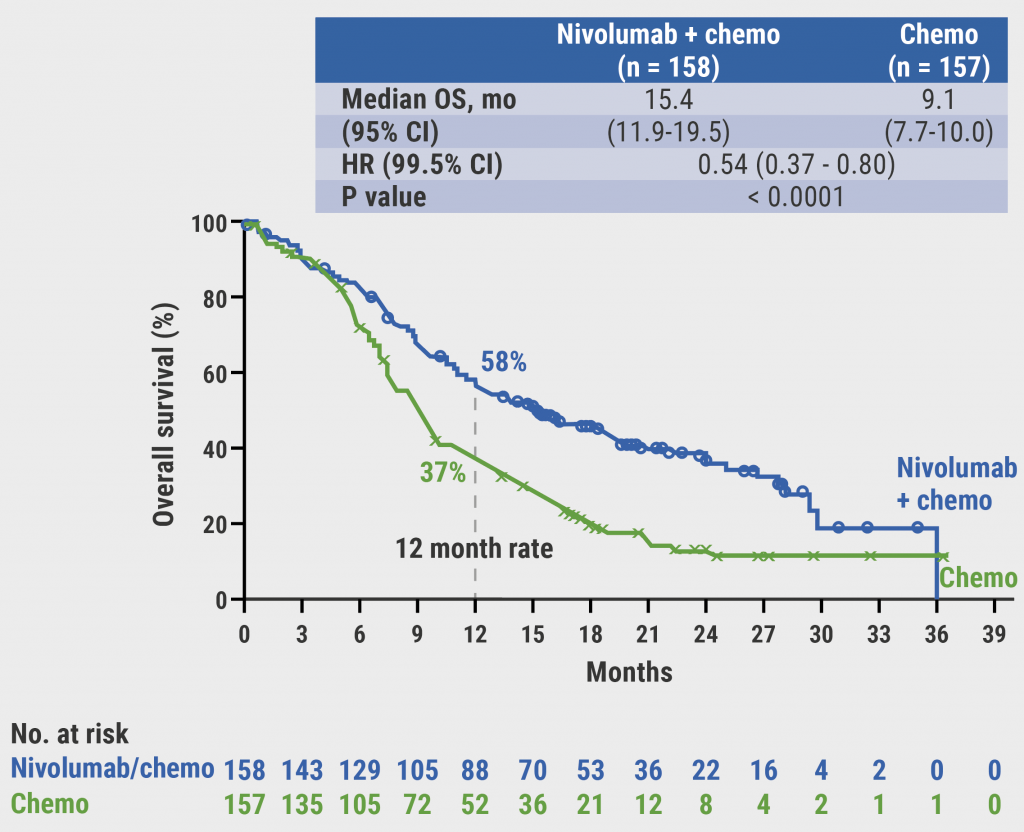Standard first-line chemotherapy for advanced or metastatic oesophageal squamous cell cancer (ESCC) results in poor overall survival [1]. Recently, first-line treatment with the PD-1 inhibitor nivolumab demonstrated superior overall survival versus chemotherapy in previously treated patients with ESCC in the ATTRACTION-3 trial (NCT02569242) [2].
The randomised, phase 3 CheckMate 648 trial (NCT03143153) explored the efficacy and safety of first-line treatment in ESCC with 2 combination therapies: nivolumab plus ipilimumab (I-O/I-O combo) and nivolumab plus chemotherapy (I-O/chemo combo). Enrolled were 970 patients with previously untreated, unresectable advanced, recurrent, or metastatic ESCC regardless of PD-L1 expression. Patients received either nivolumab (240 mg every 2 weeks) plus chemotherapy (fluorouracil plus cisplatin every 4 weeks), nivolumab (3 mg/kg every 2 weeks) plus ipilimumab (1 mg/kg every 6 weeks), or chemotherapy alone. Primary endpoints for both comparisons were overall survival and progression-free survival in patients with tumour cell PD-L1 ≥1%. Secondary endpoints were overall and progression-free survival in all randomised patients. Dr Ian Chau (Royal Marsden Hospital, UK) presented the results of the first interim analysis at a minimum follow-up of 12.9 months [3].
Both the I-O/chemo combo and the I-O/I-O combo led to statistically significant improvement in overall survival versus chemotherapy alone. Median overall survival was 15.4 months, 13.7 months, and 9.1 months for treatment with I-O/chemo combo, I-O/I-O combo, and chemotherapy alone, respectively (see Figure). A statistically significant progression-free survival benefit was also observed for I-O/chemo combo versus chemotherapy alone, but this did not meet the prespecified boundary for significance for I-O/I-O combo versus chemotherapy alone. The objective response rate (per BICR) was 53% (I-O/chemo combo), 35% (I-O/I-O combo), and 20% (chemotherapy alone). The median duration of response was 8.4 months, 11.8 months, and 5.7 months for treatment with I-O/chemo combo, I-O/I-O combo, and chemotherapy alone, respectively. Secondary endpoint of overall survival was also met, showing clear superiority in all randomised patients regardless of PD-L1 expression. No new safety signals were identified for the combination treatments. In conclusion, nivolumab + chemotherapy and nivolumab + ipilimumab each represent a new potential standard of care for patients with advanced ESCC.
Figure: Interim overall survival data of CheckMate 648 for patients with PD-L1 ≥1% [3]

- Moehler MH, et al. Ann Oncol. 2020;31(2):228-235.
- Kato K, et al. Lancet Oncol. 2019;20:1506-1517.
- Chau I, et al. Nivolumab (NIVO) plus ipilimumab (IPI) or NIVO plus chemotherapy (chemo) versus chemo as first-line (1L) treatment for advanced esophageal squamous cell carcinoma (ESCC): First results of the CheckMate 648 study. Abstract LBA4001, ASCO 2021 Virtual Meeting, 4–8 June.
Copyright ©2021 Medicom Medical Publishers
Posted on
Previous Article
« Patritumab deruxtecan (HER3-DXd) in EGFR TKI-resistant NSCLC Next Article
Glutaminase inhibitor telaglenastat does not improve survival mRCC »
« Patritumab deruxtecan (HER3-DXd) in EGFR TKI-resistant NSCLC Next Article
Glutaminase inhibitor telaglenastat does not improve survival mRCC »
Table of Contents: ASCO 2021
Featured articles
Downloadable 1-Page Editor-Selected Trial PowerPoint Slides
Breast Cancer
Excellent prognosis for breast cancer patients with ultra-low-risk gene signature
Olaparib benefits early breast cancer patients with BRCA1/2 germline mutation
Platinum-based adjuvant chemotherapy in TNBC is not superior or non-inferior to capecitabine
Dalpiciclib benefits patients with HR-positive, HER2-negative advanced breast cancer
Trastuzumab-deruxtecan showed clinical activity in patients with brain metastases
Lung Cancer
Neoadjuvant nivolumab plus chemotherapy improves surgical outcomes in NSCLC
Immune-related adverse events are associated with efficacy of atezolizumab in patients with advanced NSCLC
Sustained efficacy of nivolumab/ipilimumab plus 2 cycles of chemotherapy in NSCLC
Patritumab deruxtecan (HER3-DXd) in EGFR TKI-resistant NSCLC
Melanoma
Long-term results from ground-breaking melanoma trials
Novel dual checkpoint blockade improves progression-free survival in melanoma
Neoadjuvant therapy with nivolumab plus relatlimab is safe and effective in patients with stage III melanoma
Genitourinary Cancers
VISION trial shows improved survival with 177Lu-PSMA-617 in mCRPC
Abiraterone added to ADT + docetaxel nearly doubles survival in de novo mCSPC
Post-nephrectomy pembrolizumab improves disease-free survival
Glutaminase inhibitor telaglenastat does not improve survival mRCC
Promising efficacy and safety of feladilimab in recurrent/metastatic urothelial carcinoma
Gastrointestinal Cancers
Pembrolizumab benefits survival in MSI-H/dMMR metastastic colorectal cancer
Panitumumab added to 5-FU/LV effective as maintenance therapy in patients with mCRC
Trastuzumab-deruxtecan showed promising activity in patients with HER2-expressing mCRC
Benefit of both I-O/chemo combo and I-O/I-O combo over chemotherapy alone in oesophageal squamous cell cancer
Benefit of I-O/chemo combo over chemotherapy alone in advanced GC/GEJC/EAC
Perioperative chemotherapy and neoadjuvant multimodality therapy appear equally effective
Haematological Cancers
Olutasidenib demonstrates efficacy in patients with relapsed/refractory IDH1 mutant AML
Acalabrutinib as effective but better tolerated than ibrutinib in CLL
Gynaecological Cancers
Adjuvant chemotherapy does not improve outcome in patients with locally advanced cervical cancer
Novel drug combination for recurrent ovarian cancer
Dual HER2-blockade shows anti-tumour activity in patients with uterine cancer
Paediatric Cancer
Molecular tumour profiling impacts the diagnosis and treatment of solid tumours
Circulating tumour DNA to evaluate response in children with neuroblastoma
Basic Science
PARP7 inhibitor shows promising results in first-in-human trial
IACS-6274 is well tolerated and biologically active in selected advanced tumours
CYT-0851 shows promising anti-tumour activity across different tumour types
Related Articles

August 10, 2021
Letter from the Editor

June 24, 2021
ASCO 2021 Highlights Podcast
© 2024 Medicom Medical Publishers. All rights reserved. Terms and Conditions | Privacy Policy
HEAD OFFICE
Laarderhoogtweg 25
1101 EB Amsterdam
The Netherlands
T: +31 85 4012 560
E: publishers@medicom-publishers.com

